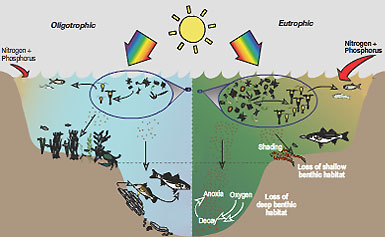Dr. Michael Kemp's research focuses on understanding the workings of ecosystems, and one ecosystem in particular – the
Chesapeake Bay. His work emphasizes two aspects of ecosystem research. "From the systems perspective, one of the major
approaches involves study of biogeochemistry," he says, "how organic and inorganic molecules are transformed and used
by organisms, and the regional scale cycles of nitrogen, phosphorus and carbon." Biogeochemical processes regulate the
cycling and availability of these key elements, which in turn control productivity of coastal environments. Another
approach is to study the organization of food webs - how material, energy, organic carbon, and nutrients flow from
plants to herbivores to carnivores. "There's a lot to be learned about the functioning of an ecosystem by studying
that web of food use," says Michael.
"My science benefits from the fact that I am involved in solving environmental problems." |
His workplace – the
University of Maryland Center for Environmental Sciences - has
three laboratories: Horn Point, which is home to Michael's lab; Chesapeake Biological Laboratory; and the Appalachian
Laboratory. The three labs work together on different aspects of the science associated with understanding a complete
watershed. Among other topics, Michael's lab focuses on hypoxia and seagrasses. His work has led to the development
of scientifically based standards for water quality restoration in the Bay, giving the coastal managers a yardstick
to measure by. There is a daily use of his science by managers; his work is built into the tools for understanding
how the Bay ecosystem works, and connecting that understanding to human activities.
|
Coastal and Estuarine Research Federation |
The Coastal and Estuarine Research Federation (CERF) gave the 2009 Odum Award for Lifetime Achievement to
Michael Kemp and his longtime colleague Walter Boynton.
|
|
|
Ecosystems services – how nature benefits human society and economies – is a philosophical underpinning to Michael's
research. "I'm a coastal ocean scientist, building this view of the whole system and how it operates," he says. "How
the animals and plants interact with the microbes and the chemistry, the biogeochemistry in the cycle; how natural
systems interact with human systems and vice versa."
Michael's background in engineering gave him a practical problem-solving perspective, and his advisor H.T. Odum
stressed that humans were part of natural systems. "I had a predisposition to want to do relevant research," he
says. "All research is relevant; it's just making those connections." Today, the focus on carbon and nitrogen
cycling makes what is occurring in a region like Chesapeake Bay relevant on a global scale.
Michael's Research
- Hypoxia, the low oxygen condition that causes coastal waters' "dead zones"
- Seagrasses, submerged aquatic vegetation that is under stress in coastal waters
- Modeling, developing dynamic processing tools


